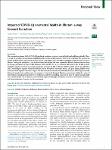Impact of COVID-19 on mental health in Bhutan: a way forward for action
| dc.contributor.author | Tsheten, T | |
| dc.contributor.author | Chateau, D | |
| dc.contributor.author | Dorji, N | |
| dc.contributor.author | Pokhrel, HP | |
| dc.contributor.author | Clements, ACA | |
| dc.contributor.author | Gray, DJ | |
| dc.contributor.author | Wangdi, K | |
| dc.date.accessioned | 2023-09-07T08:54:32Z | |
| dc.date.available | 2023-09-07T08:54:32Z | |
| dc.date.issued | 2023-04 | |
| dc.identifier.issn | 2772-3682 | |
| dc.identifier.issn | 2772-3682 | |
| dc.identifier.other | 100179 | |
| dc.identifier.uri | https://pearl.plymouth.ac.uk/handle/10026.1/21288 | |
| dc.description.abstract |
The coronavirus disease 2019 (COVID-19) pandemic continues to impact mental health and wellbeing globally. There is a lack of scientific documentation highlighting the mental health impact of COVID-19 in Bhutan. We present the mental health burdens and control measures taken, and suggest ways to further strengthen mental health services in Bhutan. During the pandemic, a rise in depression and anxiety had been reported in Bhutan. Depression rose from an average prevalence of 9 per 10,000 between 2011 and 2019 to 16 per 10,000 in 2020 and 32 per 10,000 in 2021. Similarly, anxiety rose from an average prevalence of 18 per 10,000, to 29 per 10,000 in 2020, and 55 per 10,000 in 2021. Psychological impacts related to isolation due to lockdowns, economic losses, and poor coping abilities were associated with negative outcomes. Stigma and discrimination towards mental health disorders discouraged mentally distressed people from seeking care. In response to increased demand, Bhutan's government initiated a range of interventions including home delivery of medicines and tele-counselling to people in need of urgent mental health care. Mental health care in Bhutan can be further improved through investment in services and human resources, and decentralization of services to the community. | |
| dc.format.extent | 100179-100179 | |
| dc.format.medium | Print-Electronic | |
| dc.language | en | |
| dc.publisher | Elsevier BV | |
| dc.subject | Bhutan | |
| dc.subject | COVID-19 | |
| dc.subject | Control | |
| dc.subject | Gross national happiness | |
| dc.subject | Mental health | |
| dc.subject | Wellbeing | |
| dc.title | Impact of COVID-19 on mental health in Bhutan: a way forward for action | |
| dc.type | journal-article | |
| dc.type | Journal Article | |
| dc.type | Review | |
| plymouth.author-url | https://www.ncbi.nlm.nih.gov/pubmed/37020787 | |
| plymouth.volume | 11 | |
| plymouth.publication-status | Published | |
| plymouth.journal | The Lancet Regional Health - Southeast Asia | |
| dc.identifier.doi | 10.1016/j.lansea.2023.100179 | |
| plymouth.organisational-group | |Plymouth | |
| plymouth.organisational-group | |Plymouth|PS - Office of Vice Chancellor | |
| plymouth.organisational-group | |Plymouth|REF 2021 Researchers by UoA | |
| plymouth.organisational-group | |Plymouth|Users by role | |
| plymouth.organisational-group | |Plymouth|Users by role|Academics | |
| plymouth.organisational-group | |Plymouth|REF 2021 Researchers by UoA|UoA03 Allied Health Professions, Dentistry, Nursing and Pharmacy | |
| dc.publisher.place | England | |
| dcterms.dateAccepted | 2023-03-07 | |
| dc.date.updated | 2023-09-07T08:54:15Z | |
| dc.rights.embargodate | 2023-9-8 | |
| dc.identifier.eissn | 2772-3682 | |
| dc.rights.embargoperiod | forever | |
| rioxxterms.versionofrecord | 10.1016/j.lansea.2023.100179 |


